
Legislation calls for Medicaid block grant waiver to construct an innovative plan that better serves the needs of TennCare recipients
Major legislation calling for Tennessee’s Commissioner of Finance and Administration to request a block grant waiver from the Centers for Medicare and Medicaid Services (CMS) to better serve recipients of the state’s TennCare program was approved by the Senate Commerce and Labor Committee last week. Senate Bill 1428 is designed to maximize flexibility in constructing an innovative plan that serves the needs of Tennesseans, while ensuring the state continues to receive its full share of federal Medicaid dollars. The overall goal is to provide an effective and innovative plan that is specific to the healthcare needs of all Tennesseans, while lowering costs and increasing access to patient-centered care.
The legislation requires the commissioner to submit the block grant waiver request to CMS within 180 days of the bill’s enactment. The block grant must convert funding for the program into an allotment that is tailored to meet the needs of Tennesseans. Coverage for the existing TennCare population would be maintained under the proposal.
The bill specifies that funds must be indexed for costs such as population and inflation growth. Funding must remain at the level set, without any decrease in the federal share based on deflation or a reduction in population. Administrative costs would be excluded, permitting the state to continue to draw federal matching funds for operating the program. To provide maximum flexibility regarding pharmacy benefits, the amendment includes fluctuation of prescription drug costs, diabetic testing supplies, and over-the-counter medications.
In addition, the proposal gives the state additional flexibility to serve other needy populations with distinct financial or healthcare needs.
The measure would become law upon Governor Lee’s signature. It now goes to the Senate Health and Welfare Committee on which I serve. I look forward to hearing more details in committee and the opportunity to ask questions. It must also receive approval from the Finance, Ways and Means Committee before moving to the full Senate for a final vote.
Senate Education Committee advances legislation promoting civics education
Three key bills promoting civics education in Tennessee schools were approved by the Senate Education Committee last week before members concluded their business for the 2019 session. This includes Senate Bill 800 establishing the “Governor’s Civics Seal” to recognize public schools and local education agencies (LEAs) for implementing high quality civic education programs that prepare students for career and civic life. The bill is part of Governor Bill Lee’s legislative package.
According to the Woodrow Wilson National Fellowship Foundation, a majority of Americans in every state, except Vermont, would fail a test based on the questions in the U.S. Citizenship Test administered by the U.S. Citizenship and Immigration Services. Research indicates only 38 percent of Tennesseans could pass the test, with just 13 percent scoring a grade B or higher.
Under the bill, the Department of Education and the State Board of Education would adopt criteria that a school must meet to earn the Governor’s Civics Seal. The criteria will build on Tennessee’s academic standards regarding the formation of the state and federal government, utilizing civics lesson plans and Blue Book lesson plans provided by the Tennessee Secretary of State. It will also include instruction regarding our nation’s democratic principles and practices, significant events, and individuals responsible for the creation of our foundational documents. In addition, the legislation calls for students to engage in real-world learning activities, including the Secretary of State’s student mock election and civics essay contest. The Secretary of State will assist in implementing the program.
The legislation provides that the Governor’s Civic Seal recognition will be identified on the school’s state report card. School districts in which at least 80 percent of schools received the seal will also receive the Excellence in Civic Education recognition.
In similar action, Senate Education Committee members also approved Senate Bill 1243 which raises the minimum number of questions asked on the civics exam administered to high school seniors from 25 to 50. Current law requires a civics exam be administered composed from the 100 questions provided on the test administered to immigrants applying for citizenship. This legislation requires that at least 29 questions on the test must be related to American government, 16 to American history, and 7 to integrated civics. Schools in which all graduating seniors receive at least an 85 percent score or higher on the test would receive an additional recognition by the Department of Education as a U.S. Civics All-Star School.
Finally, the committee approved legislation calling for students in Tennessee’s K-12 schools to receive instruction on the 19th Amendment, including Tennessee’s role and the events leading up to ratification. Tennessee played a pivotal role in ratification, casting the final vote needed to grant women the right to vote on August 18, 1920. The vote was narrowly won when Republican State Representative Harry Burn changed his vote from “no” to “aye.” The young 24 year-old Burn was persuaded just prior to the vote after receiving a note from his mother who favored ratification.
Senate Bill 1248 calls on the Department of Education to collaborate with appropriate groups to develop and promote instruction related to women’s suffrage. They will also be responsible for distributing instruction materials electronically to Local Boards of Educations (LEAs), as well as provide resources to aid educators via their Internet website.
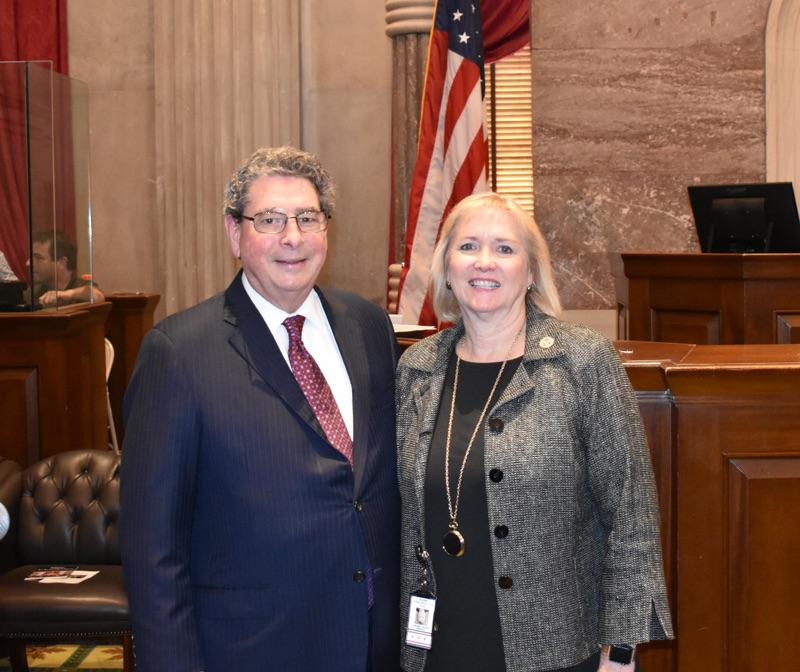
Larry Leibowitz does a great job as Chair of the Tennessee Holocaust Commission
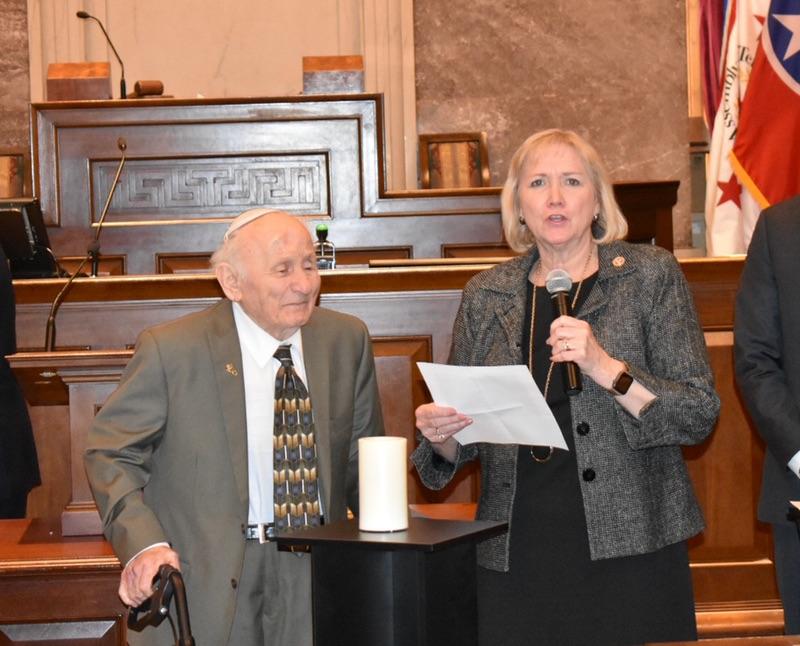
It was an honor to participate in the Day of Remembrance to honor survivors of the Holocaust
Governor Lee presents supplemental appropriation amendment to his 2019-2020 budget proposal
Tennessee Department of Finance and Administration Commissioner Stuart McWhorter presented Governor Bill Lee’s revised revenue and spending plan for the 2019-2020 fiscal year to the Senate Finance, Ways, and Means Committee. The supplemental appropriations amendment is customarily introduced by the governor in the final weeks of the legislative session to make adjustments to the budget submitted earlier in the year. It also signals the beginning of final state budget negotiations between the administration and members of the Senate and House of Representatives.
McWhorter outlined several new education initiatives, including $2.8 million to improve literacy programs. The proposal provides $750,000 in new funds for East Tennessee State University (ETSU) to establish a public-private partnership resulting in a Center of Excellence dedicated to improving health access. The Center will also focus on rural-based research to identify gaps in physical and behavioral outcomes, clinical improvement, and improved long-term care.
In other education expenditures, the amendment provides $1 million to be used by Columbia State, Motlow State, Roane State, Chattanooga State, and Cleveland State Community Colleges for their mechatronics program. This is a dual enrollment program between middle college high schools and the community colleges training students to become technicians who operate, maintain and repair high-tech automated manufacturing systems. The program provides high school students with an opportunity to receive a certificate in mechatronics that will greatly enhance their opportunities to receive a high-quality job.
In addition, the amendment provides $800,000 in new funds for Tennessee State University’s Nursery Research Center in McMinnville. This TSU facility has an annual economic impact to the nursery industry in excess of $25 million, providing research and outreach in pathology, entomology, genetics, horticulture and sustainability, and weed sciences.
The administration is also recommending $5.6 million in grants for non-profits across the state to provide a variety of needed services to Tennesseans. McWhorter said the items were identified because their missions align with Governor Lee’s priorities. Governor Lee has expressed strong support for non-profits and faith-based organizations, which he believes can be a part of the solution for many issues facing the state. Approximately 60 percent of the grants are related to education, 26 percent to reducing recidivism, and 14 percent to rural development, all of which are part of the governor’s priorities.
Other highlights include fully funding the Tennessee State Trooper Salary Survey, new money to treat prisoners under the custody of the Department of Correction who suffer from Hepatitis C, and matching funds which will help build a Radioactive Materials Training Center near the new Y-12 National Security Complex Uranium Processing Facility at Oak Ridge. This will be a highly advanced and technical state-of-the-art training facility where local, state, and federal personnel will develop advanced skills necessary to handle a spectrum of disaster incidents related to radioactive materials. In combination with the Y-12 National Security Complex Uranium Processing Facility and a separate meeting facility, the projects are expected to create 900 jobs. The $3.6 billion Uranium Processing Facility is the largest construction project in Tennessee history.
Along with consideration of the governor’s supplemental appropriations proposal, the Senate Finance, Ways, and Means Committee’s Revenue Subcommittee began reviewing 196 amendments to the budget which have been filed by State Senators.
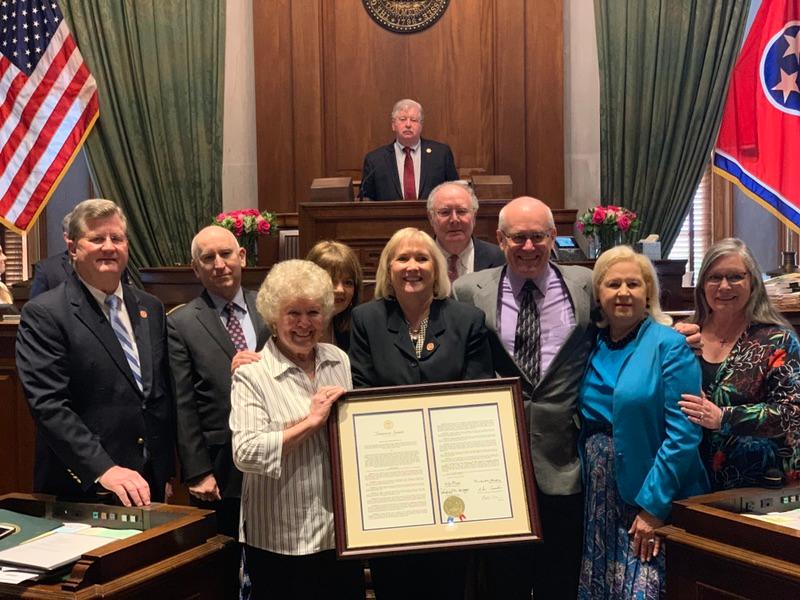
I was pleased to host former Senator Sue Atchley and her family to honor the memory of the late Senator Ben Atchley
In Brief….
Honoring Resolution / Senator Ben Atchley — On Thursday, Tennessee State Senators stood to honor the life of former Senate Republican Leader Ben Atchley who died in November at age 88. He served in the House of Representatives for 4 years and the Senate for 28 years. He was elected Senate Republican Leader for 16 years before retiring in 2004. Senate Joint Resolution 59 heralds Atchley’s distinguished public service. Among special guests joining the Senate in remembering him was his wife, former State Senator Sue Atchley, who also served Knoxville’s Senate District 6.
Constitutional Resolution / Incapacitation of governor — A resolution allowing voters to change Tennessee’s constitution to address any potential incapacitation of Tennessee’s governor was approved the full Senate Thursday. Senate Joint Resolution 154 which I am the sponsor, provides for any planned or unplanned absence of the governor when the powers and duties of the office cannot be performed. This resolution goes next to the House of Representatives. It will then need to pass with a two-thirds majority of the 112th General Assembly and then will be on the state wide ballot in 2022.
Community Oversight Boards — The full Senate approved a conference committee report on legislation aiming to create greater balance within community oversight boards in Tennessee, sending the bill to Governor Bill Lee for his signature. Although community oversight boards have existed since the 1950s, there are currently no guidelines in Tennessee governing their creation, membership, and function. Senate Bill 1407 amends the current unlimited subpoena power of an oversight board by requiring them to go to the local legislative body or city council and request a subpoena. The legislation, as amended by the report, also provides guidelines regarding the subpoena requests. The subpoenas would not be issued in the form of a blanket authorization, rather it must specify each document to be produced or witness to testify.
Daylight Saving Time Year Round – Legislation that seeks to implement daylight saving time year round in the state of Tennessee overcame its first hurdle in the Senate State and Local Government Committee last week. Senate Bill 1100 would only go into effect if and when the federal government removes the prohibition on states to regulate this matter. Year-round daylight savings time would mean that during the winter months, there would be one more hour of daylight in the afternoon, and the sun would rise one hour later in the morning. Florida and Washington have passed similar bills, and at least two dozen other states, including neighboring state North Carolina, are considering similar measures. The bill will now move to the floor of the Senate for final consideration.
Release Time Classes — Legislation expanding the opportunity for students to take release time classes in religious and moral instruction passed the full Senate. A 2015 law allowed such courses to be taught outside of school, so long as the student was not given any academic credit. Senate Bill 1373 amends this law by allowing a Local Board of Education to award one-half unit of elective credit to students completing a release time course in religious moral instruction. The bill also requires the board to develop a neutral, secular evaluation of the offered program to determine whether elective credit may be awarded. The legislation now waits for final approval from the House.
Reducing Recidivism / Education Opportunities — With research showing that the more education incarcerated individuals receive the less likely they are to turn back to a life of crime, lawmakers passed legislation this week looping prisoners into Tennessee’s Drive to 55 initiative. This is the initiative to get 55 percent of Tennesseans equipped with a college degree or certificate by the year 2025.
Senate Bill 1061 requires the Department of Corrections, in partnership with Tennessee Higher Education Commission and Board of Regents, to develop and submit to the General Assembly an annual report that details higher education opportunities available to inmates. The legislation also requires the department to develop a plan to equip ten percent of eligible inmates with a degree, diploma, or certificate by 2025 through increasing availability and participation in higher education among Tennessee’s prison population.
A separate bill furthering legislative efforts to lower Tennessee’s recidivism rates and total prison population through education and employment opportunities advanced through the Senate State and Local Committee. Senate Bill 904 incentivizes inmates to complete a reentry education program by establishing an educational sentence reduction credit of 60 days. The bill says that if a prison inmate successfully earns a high school equivalency credential, high school diploma, vocational education diploma, or other post-secondary or industry-recognized certification they can then qualify for the reduction program.
Suicide Prevention / College Students — Legislation aiming to prevent suicide among college students in Tennessee passed the Senate Education Committee. Suicide is the second leading cause of death among college students in the state. At the request of Tennessee Suicide Prevention Network (TSPN), Senate Bill 1175 requires public institutions of higher education to develop and implement suicide prevention plans in consultation with campus and community mental health experts. The state institutions will then communicate the plans to students, faculty, and staff at least twice a year through emails, websites, orientation materials, handbooks, or any other method to convey information that will help save lives. The statute calls upon TSPN to lead the state in its suicide prevention efforts and allows public colleges to rely on the resources and training available through the organization. TSPN is a grass-roots association which includes counselors, mental health professionals, physicians, clergy, journalists, social workers, and law enforcement personnel, as well as survivors of suicide attempts. The organization works to eliminate the stigma of suicide and educate communities about the warning signs of suicide, with the ultimate intention of reducing suicide rates in the state of Tennessee. The bill now moves to the Senate floor to receive final approval.
Consumers / Automobiles — The Senate approved consumer legislation which authorizes the Department of Revenue to work alongside automakers who issue a major recall to conduct consumer outreach. Senate Bill 1492 allows the Department of Revenue’s Commissioner to work with auto manufacturers to send letters from the Department of Revenue to the owner of a vehicle affected by a major recall to the issuing automaker. This will allow for such automakers to make additional and varied communications to the owner to encourage them to bring their car into the dealership for a major recall repair. The most recent recall in which this legislation will take affect is the Takata airbag recall. If you want to know if your vehicle is impacted by this major recall, please take a moment to visit www.airbagrecall.com.
Tennessee Public Charter School Commission – On Thursday, the full Senate gave approval to legislation that seeks to improve the authorization process for public charter schools in Tennessee by creating a commission of experts with appellate authority. Senate Bill 796 moves the current appellate authority to authorize, oversee, and maintain accountability of charter schools from the State Board of Education and instead places that authority with a newly created Public Charter School Commission. This move will ensure the most qualified people are making decisions on charter schools in Tennessee. The bill is part of Governor Bill Lee’s education initiatives designed to improve education opportunities for Tennessee students.
Under the legislation, charter operators must first submit an application to local school boards. If denied, then the charter operator will be able to appeal that decision to the Commission, which may approve the appeal. Their operation can then be overseen by the local school board or the commission (if the local board chooses not to). The Public Charter School Commission will be made up of nine expert members appointed by the governor and subject to confirmation by the General Assembly.
Disaster Declaration / February Storms — The federal government has granted Governor Bill Lee’s request for Major Disaster Declaration to make federal recovery assistance available to 56 county jurisdictions impacted in February’s flooding and severe storms. Counties included in the declaration are: Bedford, Bledsoe, Blount, Campbell, Carter, Cheatham, Claiborne, Clay, Cocke, Coffee, Decatur, Dekalb, Dickson, Dyer, Fentress, Gibson, Giles, Grainger, Greene, Hamblen, Hamilton, Hancock, Hardin, Hawkins, Hickman, Houston, Humphreys, Jackson, Jefferson, Johnson, Knox, Lake, Lauderdale, Lewis, Lincoln, Marion, Marshall, McNairy, Moore, Morgan, Obion, Overton, Perry, Rhea, Roane, Robertson, Scott, Sequatchie, Sevier, Smith, Tipton, Unicoi, Union, Van Buren, Warren, and Wayne. Cocke, Greene, Hamblen and Sevier.
The major disaster declaration covers the time period of Feb. 19, to March 30, 2019, and will allow government entities and certain private non-profits in the eligible counties to apply for reimbursement of specific expenses related to the disaster under the Federal Emergency Management Agency’s (FEMA) Public Assistance (PA) program. Information about FEMA’s PA program and its eligible reimbursement categories is at: https://www.fema.gov/public-assistance-local-state-tribal-and-non-profit. The federal declaration also makes Tennessee eligible for the federal Hazard Mitigation Grant Program, https://www.fema.gov/hazard-mitigation-grant-program, which provides assistance to communities to prevent or reduce long-term risks to life and property from natural hazards.
Bingo / K-12 Schools — Legislation allowing voters to amend Tennessee’s constitution to legalize Bingo games which benefit public and private schools passed final consideration on Thursday. Senate Joint Resolution 97 must be passed by the General Assembly authorizing the game if voters approve the constitutional amendment. Such action would align Tennessee law with 46 other states which allow bingo.
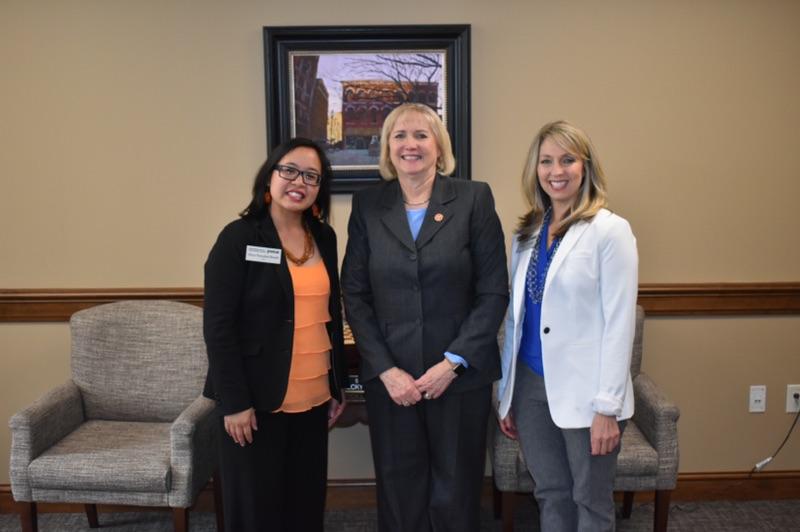
Alizza Punzalan-Randle and Maggie McNally of the Knoxville YWCA dropped by for a visit
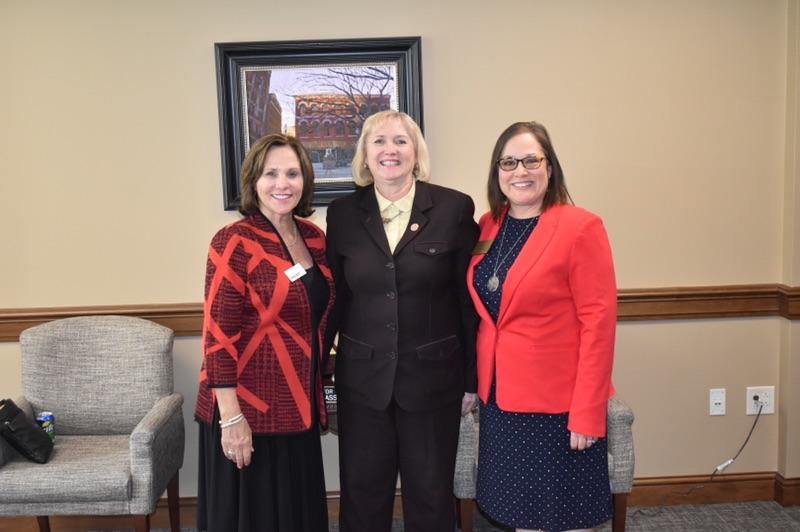
I enjoyed my visit with Elaine Streno and Rhonda Chafin of Second Harvest
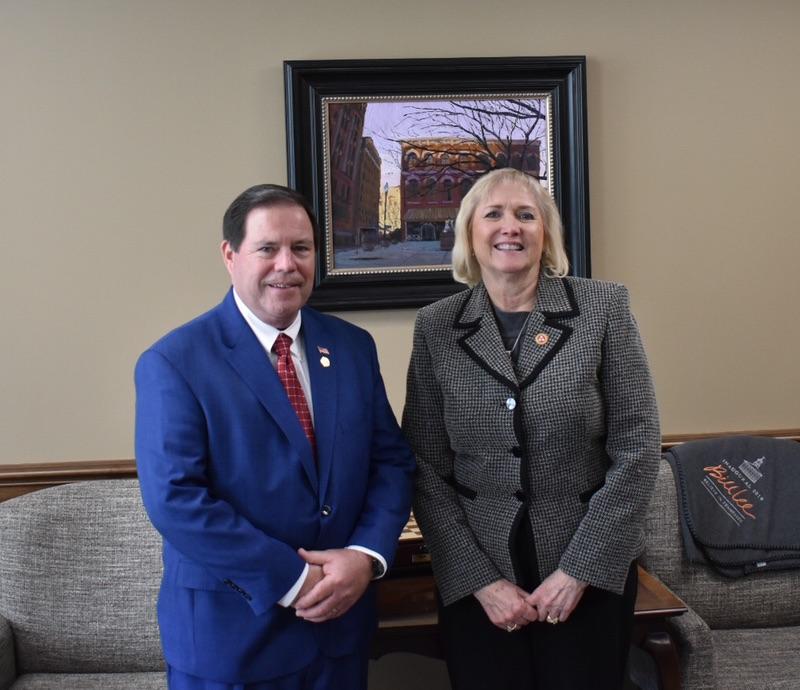
Sheriff Tom Spangler stopped by and updated me on the work of the Knox County Sheriff’s office
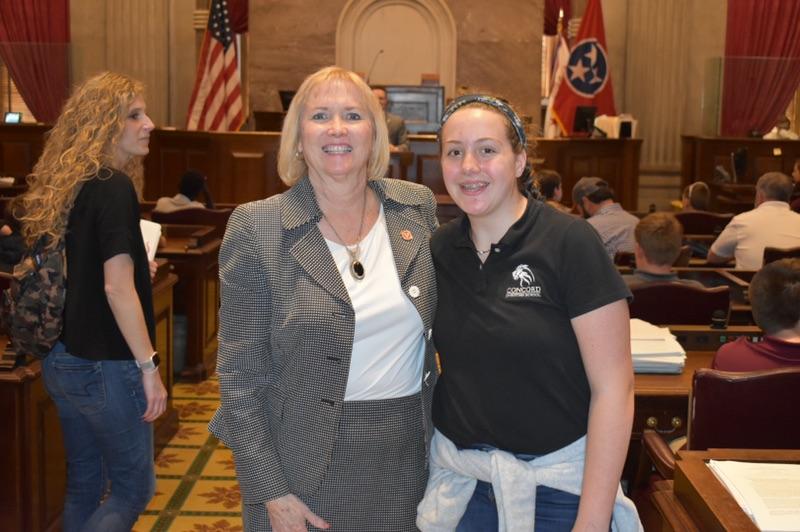
Enjoyed visiting with Keelyn Chamberlin and students from Concord Christian School
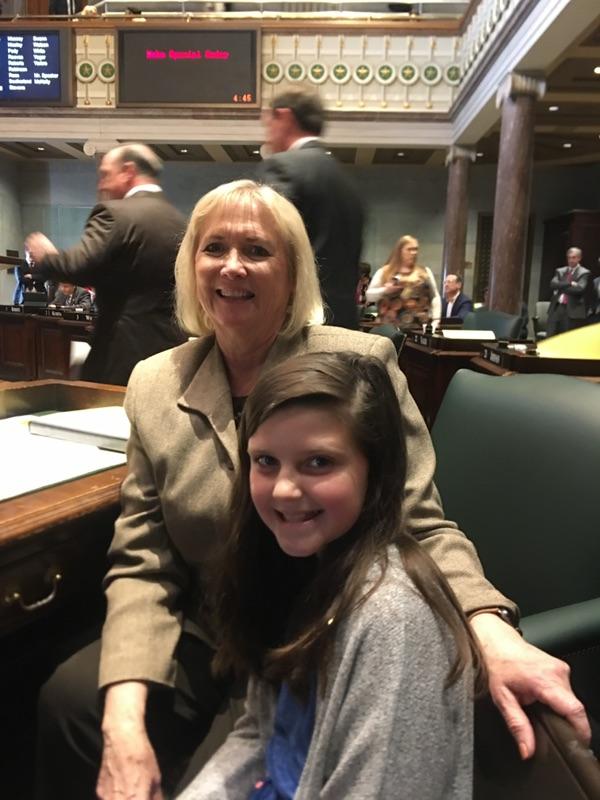
It was great having Josie Smith as my Page for the Day
For information on State Senators including phone numbers and email addresses, click Tennessee State Senators.
For House members, click Tennessee House Members
For all other information on the General Assembly including legislation, schedules and videos, click Tennessee General Assembly
As always thank you for continued support!
Sincerely,
Becky Massey
District 6 Senator
